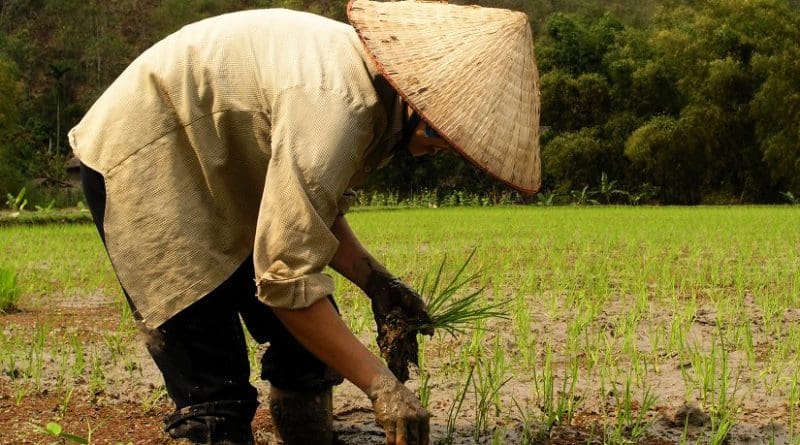Less Is More: Untapped Role Of Small Farmers In Asia – Analysis
By RSIS
The world’s small farmers, numbering in billions, risk losing their livelihoods to urban growth and climate change. Despite the grave challenges they face, small farmers can make the quantum leap into productivity if good sense in business and policy prevail.
By Manda Foo and Paul Teng*
Inadequate rural development has left more than 2.5 billion people – the majority of them small farmers with plots less than two hectares – out of economic growth. Their plight is characterised by poor access to proper land holdings, technology, credit, professional services, economies of scale and modern supply chains.
Despite the odds, small farmers contribute around half the world’s food; that figure increases to 80 per cent in Asia. Besides feeding themselves, Asian small farmers have substantially contributed to exports of rice, fish, fruit, sugar, coffee and dairy, which have enriched the region. As yields in developed countries stagnate and climate change threatens resource availability, development practitioners are turning to the productivity potential of small farmers as a beacon of hope for tomorrow’s global food security.
Livelihoods at Stake
The focus on small farmers is particularly sensible in Asia, where 87 percent of the world’s 500 million small farms exist and where the rural population is still larger than the urban. In ASEAN countries, agriculture plays a central role in supporting the livelihoods of 100 million or so people, the majority of them in Indonesia, Philippines and Vietnam.
The twin tides of urbanisation and globalisation, exacerbated by climate change, are putting increasing strain on small farmers’ livelihoods. Young males in rural areas are moving to cities in search for higher incomes, leaving behind less-educated rural women, old people and young children. A decline in agriculture’s performance due to depleting natural resources and land degradation further fuels urban migration.
Climate change affects smallholders in tropical regions more, and farmers in ASEAN have seen their lands destroyed by prolonged drought and flash floods. The scorching of barren paddy fields in the Philippines and Malaysia this year paints a grim and now common picture. However, this will not be the first time in history that small farmers have had to adapt, and their chances of success are improved if given access to proper governance, business skills and science.
Silver Linings: Biotechnology and Back to Basics
The challenge at hand is doubling food production using less resources to feed nine billion people – many with diversified diets – by 2050. Smallholders are particularly suited to help meet this with the combination of traditional farming methods and biotechnology crops. Both are suited to smallholder production and could provide the needed quantum leap in productivity.
Biotechnology encompasses a collection of technologies that includes biotechnology crops. The latest report by the International Service for the Acquisition of AgriBiotech Applications (ISAAA) shows that biotech crop’s proven benefits are astounding: 18 million farmers that adopted biotech crops have seen incomes and profits rise an average of 68 per cent. They cut pesticide use by a third (collectively equivalent to 584 million kg!) and saw yields increase by a fifth. Global biotech crop area increased 100 fold to 180 million hectares last year. Farmers in the Americas have been most receptive, making it the region consistently producing food surpluses for export to Asia.
Future prospects are impressive with new biotech crops in the pipeline and a new “genome editing” technology that will bypass restrictive regulatory roadblocks and shorten the time to application. These opportunities hold immeasurable potential for Asian governments to turn the tide from being net food importers to being more self-sufficient and resilient through their untapped assets of small farmers.
Biotechnology is not a panacea but it is an important set of technologies that should complement traditional or indigenous agricultural practices. Since the first agrarian communities were settled 10,000 years ago, humans have been modifying both the environment and their food sources, such as through using irrigation and breeding for better crops. Early agricultural science is a precursor to contemporary achievements and not in opposition. Separating traditional knowledge with modern science creates false schisms and does not contribute to finding bold solutions for food security and sustainability.
Technological advancements like biotechnology should be balanced with a back-to-basics philosophy and science-based traditional practices, where man understands he is part of nature’s cycles and dynamics and not above it.
Moving Forward: Inclusive Agriculture
The germane question regarding smallholder farmers is not whether they have a role to play in food security, but how companies and governments can tap their strengths and enable them to become an integral part of modern agri-food supply chains. A shining ray of hope is the emergence of agribusiness initiatives to engage small farmers, often starting with corporate social responsibility projects and leading to strong business alignments. This helps small holders move from subsistence to entrepreneurship. Groups like the International Fund for Agricultural Development and the Grow Asia are at the forefront of these initiatives, working with the private sector, government agencies and the ASEAN Secretariat.
For the estimated 100 Million small farmers in ASEAN, every pilot to engage them has the potential to create multiplier effects and uplift an entire rural community. The image of a small farmer should not be one of a disenfranchised peasant losing his land to mercenary business and climate extremities, but of a resilient, purposeful individual empowered by his ability to feed his household and his country. Now is the time to upscale these many pilots.
*Manda Foo is a Research Associate in the National Institute of Education (NIE). Paul Teng is Professor and Principal Officer, NIE, and Adjunct Senior Fellow at the Centre for Non-Traditional Security (NTS) Studies, S. Rajaratnam School of International Studies (RSIS), Nanyang Technological University.

